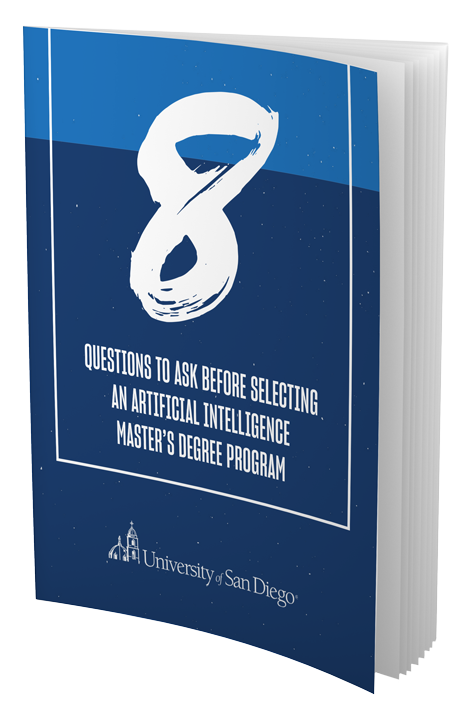Want to Work in Machine Learning?
Check Out the Career Landscape + 8 Top ML Jobs
Video surveillance, traffic alerts on your smartphones, facial recognition software, product recommendations as you browse a website — these are all examples of real-life machine learning applications.
Computer and information technology jobs are booming, with employment projected to grow 11% from 2019 to 2029. More specifically, the Future of Jobs Report 2020 predicts that artificial intelligence (of which machine learning is a subset) will create 12 million new jobs across 26 countries by 2025 (a figure representing a net gain — 97 million new jobs created while 85 million are displaced).
This significant increase in AI positions means the demand for machine learning professionals is high. Not only are these positions in high demand, but they are also high paying, with many salaries well over $100,000 and some even more than $200,000.
In this comprehensive guide, learn more about the top machine learning career paths, the skills required, jobs and salary outlook and much more.
What is Machine Learning?
First, let’s explore the definition of machine learning, which is categorized as a subsection (or type) of artificial intelligence. Machine learning is “all about extracting valuable information from data” — which could be anything from text and video to images and sound. As the name implies, the ability to learn is what separates machine learning from other AI subsets.
“Machine learning is a branch of AI that gives computer systems the ability to automatically learn and improve from experience, rather than being explicitly programmed. In machine learning, computers use massive sets of data and apply algorithms to train on and make predictions,” according to TechRepublic.
What Does a Machine Learning Professional Do?
There are several types of machine learning professionals, and job responsibilities may overlap with other roles, depending on the size of an organization. In general, machine learning deals with complex challenges.
“People interested in machine learning are often problem solvers,” according to U.S. News & World Report. “They are motivated by the challenge of finding patterns that others can’t see. They develop tools that can sift through huge datasets and find the commonalities. They want to turn the unknown into the known and help make better decisions and produce better results.”
One of the most sought-after AI professionals is a machine learning engineer, whose responsibilities include building and managing platforms for ML projects. As Discover Data Science explains, machine learning engineers may often double as data scientists at smaller organizations.
Skills a Machine Learning Professional Needs
According to TechRepublic, machine learning engineers must be skilled in the following:
- Computer science fundamentals
- Programming
- Math and statistics
- Data science
- Deep learning
- Problem solving
- Software engineering and system design
- Artificial intelligence
Soft skills are also extremely valuable in machine learning positions. These include:
- Teamwork
- Good communication
- Organization
- Strong work ethic
Steps Toward a Career in Machine Learning
Undergraduate degree
The first step toward establishing a career in machine learning is to secure an undergraduate degree in computer science, mathematics, data science or computer programming.
Experience
As described by Discover Data Science, some machine learning roles may require previous experience in an engineer or artificial intelligence-specific role. For example, it’s important to know that a machine learning engineer is not an entry-level position, but one that often requires experience in data science and software engineering — plus an advanced degree. For a career in machine learning, you may want to start in a software engineer, software programmer, software developer, data scientist or computer engineer role.
Advanced degree
For most machine learning careers, an undergraduate degree will not suffice. A master’s in computer science, software engineering, artificial intelligence or machine learning can advance your career. Core machine learning courses may include computer science, high-level mathematics, applied machine learning, statistics, research, data analysis, artificial intelligence and more.
An advanced degree in artificial intelligence can prepare students for a wider range of AI- and ML-related opportunities.
8 Career Paths in Machine Learning
| Career | Description | Median Salary^ |
| Machine Learning Engineer | Builds and manages platforms for machine learning projects* | $150,000 |
| Data Scientist | Collects, analyzes and interprets complex sets of data by using machine learning and predictive analytics* | $122,579 |
| Natural Language Processing (NLP) Scientist | Works with computers to “understand, interpret and manipulate human language.” Draws from computer science and computational linguistics to bridge the gap between human communications and computer understanding.** | $101,574 |
| Business Intelligence (BI) Developer | Analyzes data sets for business and market trends* | $102,276 |
| Human-Centered Machine Learning Designer | Responsible for the “design, development and deployment of information systems that learn from and collaborate with humans in a deep, significant way.”*** | $116,668 |
| Software Engineer | Researches, designs, implements and supports software solutions.+ Oversees the whole system and uses engineering concepts to develop software.++ | $107,294 |
| Software Developer | Responsible for the entire software development process.++ | $103,620 |
| Computational Linguist | Teaches computers how to understand human language.+++ | $109,168 |
^ Media salary figures may be subject to change. Please click on the links to see updated averages.
* 5 Careers in Artificial Intelligence
** Natural Language Processing (NLP)
*** Responsible AI Can Effectively Deploy Human-Centered Machine Learning Models
+ What Are the Responsibilities of a Software Engineer?
++ Software ‘Developer’ or ‘Engineer’: What’s the Difference?
Machine Learning Job & Salary Outlook
Overall, the outlook for all types of computer and technology occupations is extremely favorable and expected to grow by about 11% from 2019 to 2029, according to the U.S. Bureau of Labor Statistics. This is much faster than the national average for all occupations.
According to Glassdoor, the average machine learning salary is $114,121 with some salaries well beyond $150K+. The average machine learning base salary is $146,085, according to Springboard’s Machine Learning Engineering Salary Guide.
Indeed named the position of Machine Learning Engineer the #1 best job of 2019. And according to the same report, “With an average salary base of $146,085 and a whopping 344% growth in job postings, machine learning engineer is an extremely promising position. Those considering a career change or new to the workforce might want to consider training for this role. Most machine learning engineers have completed a master’s degree or taken an online certification course.”
Companies Hiring Machine Learning Professionals
A recent search for “machine learning” job openings on LinkedIn revealed more than 40,000 results at a wide variety of companies and industries, some of which are cited below. (You can see similar LinkedIn results here.)
- Amazon
- Adobe
- PlayStation
- Apple
- Levi Strauss & Co.
- Lockheed Martin
- Spotify
- Verizon
- Lyft
- PayPal
- Bank of America
- Zoom
- Groupon
Machine Learning Career FAQs
Q: What programming languages are recommended to learn to become a machine learning engineer?
A: From TechRepublic: “An IBM report ranked Python, Java, and R as the top languages for machine learning engineers, followed by C++, C, JavaScript, Scala, and Julia.”
Q: What are the most popular industries for machine learning positions?
A: Machine learning jobs are available across a wide variety of industries, but according to a recent LinkedIn search, some of the most popular include:
- Defense and space
- Computer software
- Internet
- Financial services
- Information technology and services
Q: What are the top areas for AI and ML jobs?
A: According to Forbes, New York, San Francisco and Washington, D.C. were the top three cities for AI and machine learning jobs in 2019.
Q: What is the salary range for machine learning positions?
A: The salary depends on a number of factors, including specific job responsibilities and experience, but typically the low end of the range starts around $90,000 and can go upwards of $150,000 or more than $200,000 for a machine learning engineer.
Take Your Machine Learning Career to the Next Level with an Advanced Degree
High-paying career opportunities in AI, machine learning and related disciplines continued to expand across a variety of industries. An advanced degree in artificial intelligence can position you for success and provide a competitive edge in the growing artificial intelligence job market, which includes machine learning.
The University of San Diego — a highly regarded industry thought leader and education provider — offers an innovative, online AI master’s degree program, the Master of Science in Applied Artificial Intelligence, which is designed to prepare graduates for success in this important, fast-growing field. This program includes a significant emphasis on real-world applications, ethics, privacy, moral responsibility and social good in designing AI-enabled systems.




